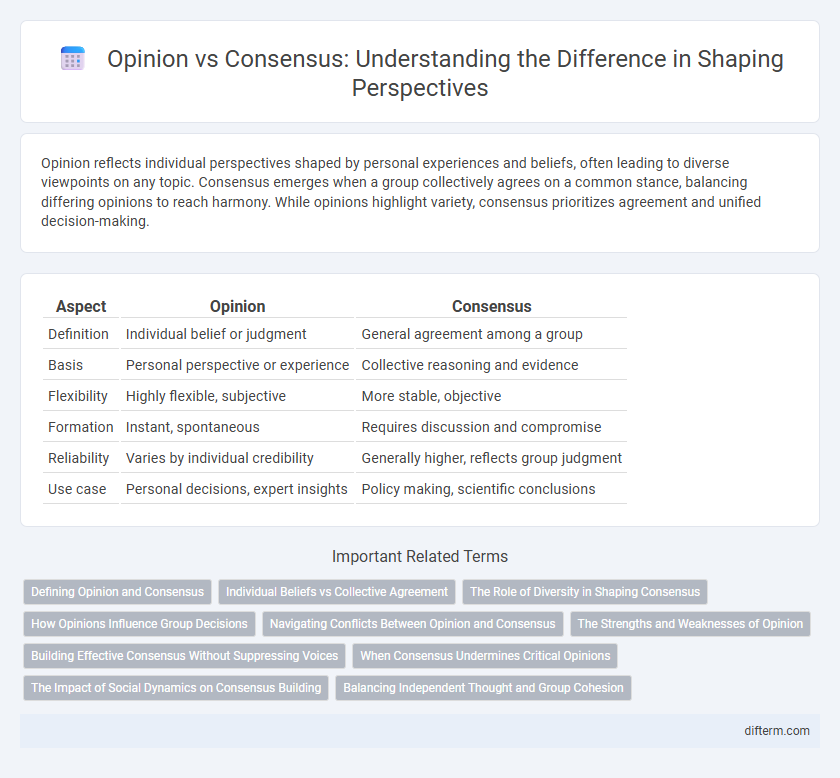Opinion reflects individual perspectives shaped by personal experiences and beliefs, often leading to diverse viewpoints on any topic. Consensus emerges when a group collectively agrees on a common stance, balancing differing opinions to reach harmony. While opinions highlight variety, consensus prioritizes agreement and unified decision-making.
Table of Comparison
| Aspect | Opinion | Consensus |
|---|---|---|
| Definition | Individual belief or judgment | General agreement among a group |
| Basis | Personal perspective or experience | Collective reasoning and evidence |
| Flexibility | Highly flexible, subjective | More stable, objective |
| Formation | Instant, spontaneous | Requires discussion and compromise |
| Reliability | Varies by individual credibility | Generally higher, reflects group judgment |
| Use case | Personal decisions, expert insights | Policy making, scientific conclusions |
Defining Opinion and Consensus
Opinion represents an individual's personal belief or judgment formed without requiring universal agreement, often influenced by subjective experiences and emotions. Consensus, in contrast, denotes a collective agreement reached through discussion and compromise, reflecting a general alignment among group members. Understanding the distinction between opinion as a singular viewpoint and consensus as a shared collective decision is crucial in decision-making and social dynamics.
Individual Beliefs vs Collective Agreement
Individual beliefs shape unique perspectives and drive innovation by reflecting personal experiences and values. Collective agreement emerges from shared understanding and compromise, fostering social cohesion and coordinated action. Tension between personal conviction and group consensus influences decision-making processes and cultural evolution.
The Role of Diversity in Shaping Consensus
Diversity plays a crucial role in shaping consensus by introducing a wide range of perspectives, which challenges homogeneous thinking and fosters more nuanced decision-making. When diverse opinions converge, the resulting consensus tends to be more robust, inclusive, and representative of the broader community's interests. A consensus built on varied viewpoints is less prone to groupthink and better equipped to address complex issues with innovative solutions.
How Opinions Influence Group Decisions
Opinions shape group decisions by introducing diverse perspectives that challenge consensus and foster critical thinking. When individuals voice unique viewpoints, groups evaluate alternatives more thoroughly, which can lead to more informed and balanced outcomes. Strong opinions may shift majority views, highlighting the dynamic interplay between personal beliefs and collective agreements.
Navigating Conflicts Between Opinion and Consensus
Opinion often reflects individual perspectives grounded in personal experience or values, while consensus emerges from collective agreement aiming for a common ground. Navigating conflicts between opinion and consensus requires balancing subjective viewpoints with the need for shared decision-making, emphasizing respectful dialogue and critical listening. Effective conflict resolution depends on acknowledging diverse opinions without undermining the legitimacy of consensus-based outcomes.
The Strengths and Weaknesses of Opinion
Opinion offers unique insights grounded in personal experience and perspective, fostering diversity of thought essential for innovation and critical debate. However, opinions can be biased, subjective, and sometimes uninformed, which may lead to misunderstandings or conflicts when not balanced with evidence and open-mindedness. The strength of opinion lies in its ability to challenge the status quo, but its weakness is the potential to polarize or mislead without consensus or factual support.
Building Effective Consensus Without Suppressing Voices
Building effective consensus requires creating an environment where diverse opinions are valued and openly expressed, ensuring that every voice contributes to the decision-making process. Techniques such as active listening and structured dialogue help reconcile differing viewpoints without marginalizing minority perspectives. Prioritizing inclusivity over conformity fosters innovative solutions while maintaining group cohesion and respect.
When Consensus Undermines Critical Opinions
Consensus often suppresses critical opinions by prioritizing agreement over diverse viewpoints, leading to groupthink and stifled innovation. When individuals conform to dominant narratives, they may withhold valuable dissenting insights that challenge assumptions and drive progress. Encouraging critical opinions within consensus-driven environments fosters deeper analysis and prevents stagnation in decision-making.
The Impact of Social Dynamics on Consensus Building
Social dynamics significantly influence consensus building by shaping individuals' willingness to align their opinions with group norms and perceived majority views. The pressure to conform often suppresses dissenting opinions, leading to a consensus that may not accurately reflect individual beliefs. Understanding these social influences is crucial for fostering genuine consensus rather than superficial agreement.
Balancing Independent Thought and Group Cohesion
Balancing independent thought and group cohesion requires valuing diverse opinions without sacrificing unity; encouraging open dialogue strengthens critical thinking while fostering mutual respect among members. Strong consensus emerges not from conformity, but from integrating varied perspectives into a shared understanding that advances collective goals. Maintaining this equilibrium supports innovation and trust, essential elements for effective decision-making and social harmony.
opinion vs consensus Infographic

 difterm.com
difterm.com